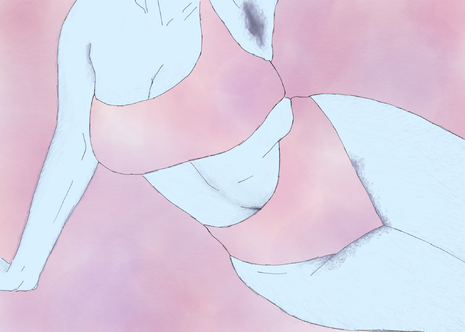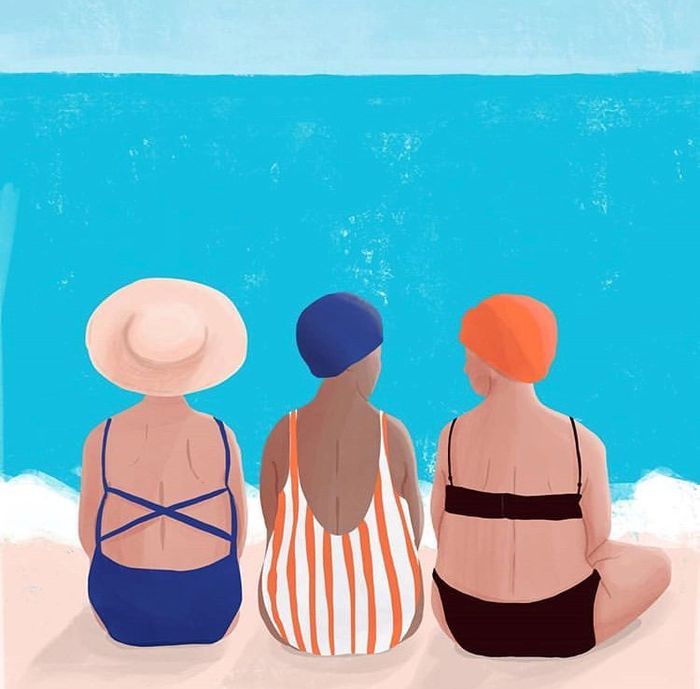Nice girls don’t have body hair
Miranda Stephenson explores the racist, sexist stigmas surrounding the pressure to shave, and questions why we care about female body hair in the first place.

Let’s begin with a little bit of history.
Once upon a time, way back in 1900, female body hair was largely a non-issue. From the time of Queen Elizabeth I, any hair below the head had been considered perfectly normal; artists’ models, actresses and dancers would often shave, of course, but their habits had little bearing on those of ordinary women.
Then, in 1915, that all changed. Gillette had become a household name in the US after signing off on a deal to supply every soldier with a razor. Unfortunately for its shareholders, it also had no way to target women within the current beauty framework.
Still, clever advertising makes money- and true to form, the Gillette campaign was cutting-edge.
Taking advantage of women’s dresses becoming sleeveless, new adverts falsely claimed that hairless underarms were à la mode in Europe. Armpit hair was degraded as “embarrassing” and “unsightly” in order to shame women into buying the first ever female razor. No matter that it had a ridiculously faux-French name: Milady Decolletée was the revolution. When tights became expensive during WW2, adverts were quick to remind young women that they had better start shaving their ugly bare legs as well.
Fast-forward to the present day, and shaving is the accepted norm. A 2016 YouGov poll even found that nearly half of all women under 35 remove their pubic hair entirely. The moral of the story is, the reason that your boyfriend thinks your unshaved legs are gross? Chances are, it’s because of capitalism.
I was eleven years old when I first started shaving.
“The moral of the story is, the reason that your boyfriend thinks your unshaved legs are gross? Chances are, it’s because of capitalism.”
By nature, I have very dark, obvious hair on my legs and underarms. Back then, I’d never heard of shaving cream; I was irrationally petrified of nicking the skin, accidentally cutting an important vein, and bleeding to death on the bathroom floor before my thirteenth birthday. It was my mum who told me to shave in the first place, hoping to protect me from would-be bullies. In fact, the only teasing I remember is the casual, familiar joking that bubbled up sometimes from my uncle. He found it funny to make monkey noises upon seeing my unshaved legs; one time, he danced around the kitchen pretending to be an ape. Low-level jibes, really, and he would always stop after a sharp retort, but it always struck me as ironic when his own legs were hairier than mine.
Why is it that men are allowed this ape-like orangutan hair without comment, but women are told to shave it all off? If hairiness is bestial, the curiously hairless state of a fully waxed woman seems dangerously comparable to a pre-pubescent child. This does not apply to women who naturally have little to no hair at all; my point is just that this artificial, universal dichotomy of body hair has alarming connotations. If hairy men are like animals and waxed women are childlike, both parties are alienated from sexual agency. Male violence and rape culture are excused as primal nature; simultaneously, the female body may potentially be viewed as childishly vulnerable and yielding, reinforcing gendered power dynamics. When girls, teenagers, and grown women alike are considered to be largely hairless, this enables both the sexualisation of children and the normalisation of men with much younger female sexual partners. A woman straying into hairy, animalistic territory is not saved by virtue of being a man, nor can she be the smoothed, shorn woman depicted in media. Society must therefore classify her as wholly beast: her monkey hair, unlike male human hair, is considered dirty, unhygienic, and worthy of disgust.
For the record, of course, female body hair is actually there to keep the body healthy. Pubic hair stops dirt and bacteria from entering the vagina and reduces heat loss; armpit hair protects vital arteries and aids the release of sex pheromones.
I still remember an old Instagram post by a girl in my athletics group, probably long since deleted by now. She was posing at a distance with her arms raised, her caption something along the lines of “Before anyone says anything, that’s just shadow under my arms: I know basic hygiene x”. In fact, her hair was very light brown. She exalted because this meant that she didn’t have to shave her legs, although they were still hairy. It seems as if it wasn’t really body hair itself that she considered unhygienic, but rather the idea of that hair being seen. It’s curious: in winter, body hair is acceptable no matter its colour, because women wear long trousers with which to cover it up. The arguments that smooth skin is cleaner or more feminine suddenly fly out of the window.
"When girls, teenagers, and grown women alike are considered to be largely hairless, this enables... the normalisation of men with much younger sexual partners."
On another level, this distinction between blonde and dark coloured body hair can result in racism as an unconscious by-product. Middle Eastern, Mediterranean or South Asian women sometimes have thicker, darker hair in more variable places than the typical East Asian or white woman. Whereas a blonde woman may consider the routine of plucking her eyebrows and occasionally shaving her pits a simple task - comparable to shaving one’s beard and moustache - a woman with hair on her arms, legs, upper lip, chin, toes and cheeks may find her own shearing considerably more time-consuming and painful. The hairless beauty ideal was created with exclusively white women in mind. Considering this, if a girl criticises a friend for her unfamiliar body hair – not because the friend is Indian, for example, but just because she has belly hair – this can manifest as a subtle, insidious sort of racism, regardless of intent.
If this is the case, our society’s squeamishness around female body hair has become so much more than just a marketing triumph. If a woman is only acceptable when presented in a specifically shaven state, women have been forced into an endless race with uneven starting lines. The very essence of what a woman is and may be is limited by a misogynistic, racist hierarchy in which some women are more beautiful and others are more animal; some are more passive and others more uncouth. Because so many girls begin shaving at the first sign of hair, their perception of what is ‘natural’ is distorted, increasing their contempt of women who fall foul of the standard. It’s not a problem if you want to shave because you like the look or the feel or the confidence it gives you. Only next time you pick up a razor, you might take the time to consider the extent to which this decision is fully your own.
 News / University Council rescinds University Centre membership20 February 2026
News / University Council rescinds University Centre membership20 February 2026 News / Hundreds of Cambridge academics demand vote on fate of vet course20 February 2026
News / Hundreds of Cambridge academics demand vote on fate of vet course20 February 2026 News / Judge Business School advisor resigns over Epstein and Andrew links18 February 2026
News / Judge Business School advisor resigns over Epstein and Andrew links18 February 2026 News / Union cancels event with Sri Lankan politician after Tamil societies express ‘profound outrage’20 February 2026
News / Union cancels event with Sri Lankan politician after Tamil societies express ‘profound outrage’20 February 2026 News / Caius students fail to pass Pride flag proposal20 February 2026
News / Caius students fail to pass Pride flag proposal20 February 2026










